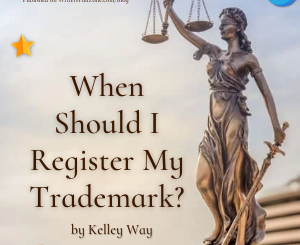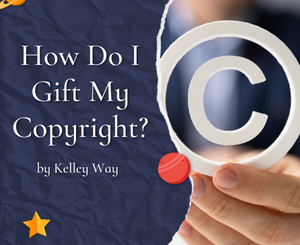Copyright 101 for Authors

Welcome to the monthly series on legal issues for authors to empower you, the artist entrepreneur. Today we focus on what copyright does from our monthly guest columnist, Kelley Way, a lawyer specializing in literary law and other aspects of law. She’s also a writer! If you have general questions for Kelley on contracts or other aspects of literary law, be sure to comment below. And you can also email her, too.
PS. A list of books on literary law can be found here.
And now for a bit of necessary legalese: Please note that this article does not constitute legal advice, and that an attorney-client relationship is not formed by reading the article or by commenting thereon.
****
In a previous post, “What is Copyright?” I covered what a copyright is.
In this post, I’ll be talking about what a copyright does, i.e. what rights a copyright owner has in his or her work.
Copyright grants book authors five very specific and exclusive rights:
- Right of Reproduction. This was the very first right granted to authors, and the right from which copyright gets its name (the right to copy, a.k.a. the copy right). This right is fairly self-explanatory: the copyright owner is the only one allowed to make copies of the work, or to give permission for others to do so. It doesn’t matter whether it’s an exact copy, or if the copying was intentional; as long as the reproduction is fixed (saved so that it can be produced later, like on a piece of paper or in a hard drive), then it’s considered a copy.
- Right of Adaptation. This is the right to make derivative works based on the copyrighted work, such as movies, translations, or audiobooks. Unlike the reproduction right, the derivative work does not need to be fixed to infringe on the copyrighted work. The only requirement is that the copyrighted work is incorporated in some concrete or permanent form.
- Right of Public Distribution. This is right is also fairly self-explanatory: the copyright owner is the only one allowed to distribute the work, or to give permission for others to do so. This right does not apply after the first sale of a legitimate copy of the work; once it’s been sold, the buyer can do whatever he or she wants with it, including sell it to someone else. This is known as the “first sale doctrine.”This right also includes the right of importation, which prevents people from bringing foreign copies into the U.S. to sell (it doesn’t matter whether it’s a legitimate copy or not, only that it was not made in the U.S.). The first sale doctrine does not apply to unauthorized copies of the work; any sale of an unauthorized copy is a violation of the distribution right.
- Right of Public Performance.This right is probably geared more towards dances, plays, music and movies, but this applies to books as well. A performance includes a recitation of a work, live or recorded, so reading a book aloud or playing an audiobook in public are activities that the copyright owner has the exclusive right to do.Whether the performance is public depends on if the location is open to the public, or if the audience is a large group “outside of a normal circle of a family and its social acquaintances.” (17 U.S.C. § 101)
- Right of Public Display.This right is definitely geared towards art and sculptures; however, the Internet has raised new issues with this right, just like it has all the other rights discussed so far.Even before the Internet, this right was severely limited: anyone who lawfully acquired a copyrighted work could display it in public.Putting the work, or pictures of it, somewhere other than where the work is located, such as TV, would violate this right. The courts have found that image thumbnails stored on search engine servers are technically a violation of this right, but the search engine may have a fair use defense, since thumbnails are lower quality than full-sized pictures, and the purpose is to direct consumers to where the full-sized images can be found.
I’m afraid that the application of copyright law to the Internet is still something of a murky subject. Everyone agrees that the Internet has significantly changed the copyright field, but people are still feeling their way through what exactly that means, now and for the future.
The court system and the legislature are working on adapting copyright law to deal with this new medium, but neither of them tend to move quickly, so it will likely be awhile before there is any clarity on the subject.
Please let me know if you found this helpful, or just plain confusing.
If you have questions, comments, or suggestions for future posts, please email me or leave a message in the comments below.
***
ABOUT THE AUTHOR
Kelley Way was born and raised in Walnut Creek, California. She graduated from UC Davis with a B.A. in English, followed by a Juris Doctorate. Kelley is a member of the California Bar, and an aspiring writer of young adult fantasy novels. She can be contacted at KelleyAWay@gmail.com.







